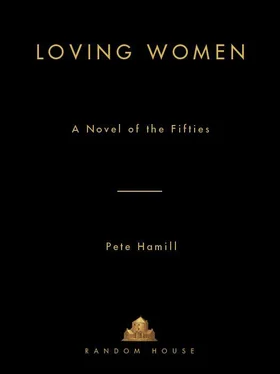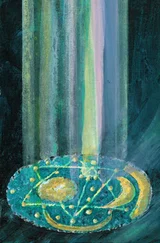The bus made a slow half turn and stopped parallel to the gate. I was the only passenger with a sea bag, so I waited for the others to get off, then stepped out and saw the others presenting their ID cards to a Marine sergeant. The civilians nodded to the Marines, the sailors saluted. I went up to the sergeant.
“Airman apprentice Michael Devlin reporting for duty, sir,” I said and saluted. The Marine’s face was a formal grid. He looked at the papers and the ID card and then at me. He returned the salute.
“Welcome aboard, sailor,” he said.
With the sea bag on my shoulder, I walked down the main street of the base, following the Marine’s directions to the barracks. I tried to walk in what I thought was a rolling, sea-duty gait, just in case anyone was watching, an affectation so heavily practiced then that it became in fact my adult walk. In the years that followed, women sometimes laughed at it, and so did I, but it is now too late to make a change. Sometimes you actually become what you want to become. But on the first day of 1953 I was not yet formed as a man, and was still anxiously trying on the various styles of the world. Perhaps that’s why I still see myself so clearly, walking for the first time into Ellyson Field. Anxiety sure does sharpen focus.
I know that I turned left into a street without sidewalks. And I remember how the grass came right down to the curbs, as precisely cut as my boot-camp crewcut, uniformly green and flat and perfect. A rich, creamy earth smell rose from the grass and little jewels of water sparkled among the blades. That odor is one of the memories I can never reclaim in the way buildings can be revisited, and streets; my senses have been blunted by too many cigarettes. Everywhere I go, the American air is now stained with the fumes of gasoline and chemicals. That day I inhaled the fresh wet air and thought: I’m in Florida, goddamnit, and nobody I ever knew has been here before me .
Three raked gravel paths were cut through the grass from the street to the barracks doors. I stood there for a moment, wondering which door to choose, hearing the chirring sound of insects in the close, drowsy air. The Bachelor’s Enlisted Men’s Quarters were in a wooden building almost a block long, painted a shiny white. Birds clung to the peak of the tar-papered roof. I couldn’t see through the screened windows. The entire building was three feet off the ground, on concrete blocks the color of mice.
I turned and looked around at my new slice of the world. Most of the base was blocked from my view by the low white building right across the street. My pulse quickened when I saw a sign saying Supply Department . That’s where I’d be working. And I felt as if I’d put something over on the Navy Department. I could sleep late and still make muster in less than a minute. Right across the street . Beautiful.
From where I stood, the building seemed to be divided in two. There was a door in the center, and through the windows on the left of it I could see the rough wood of packing crates. Nothing was clear through the screened windows on the right. That’s where they must work , I thought, and all the gear must be stored in the section on the left . I was standing there for what seemed a long moment, trying to imagine what might happen to me on the other side of those doors, when I heard from a great distance the sound of a saxophone.
He was playing the blues. A slow, mournful tune, drifting from somewhere on the empty base. Long sad lines. And then a pause. And then more long lines. A tenor, probably. Little phrases breaking and curling around themselves and then a longer line, and then a pause again. Sounding as lonesome as I was. Like a broken heart. Or hunger. Or jail.
Then it stopped. I waited and listened. But there was no other sound except the insects and the muffled engine of a lone helicopter: chumpchump chumpchump chumpchump .
I lifted the sea bag and started up the path to the barracks, my feet crunching on the gravel. I opened the screen door, and went through into a cool gray room with a picture of Harry Truman on the wall. He was still president; Eisenhower had been elected the previous November, but wouldn’t take office until January. To the right was a corkboard covered with Navy bulletins; a small wooden table and chair were shoved against the wall. Through an archway, I could see double-decker bunks divided down the center by a row of high metal lockers. The floor was scrubbed almost white. Sunlight knifed through the windows, making glaring patterns on the floor. I laid the sea bag down and stepped into the room. There wasn’t a single person in sight. I remember feeling like a burglar.
“Hello?” I said. “Anybody home?”
There was no answer.
Then I heard a toilet flushing at the far end of the row of bunks and walked toward the sound. Names were stenciled on some of the lockers. Each bunk was made up like the next, the mattress covers pulled taut and rough Navy blankets folded at the foot. I heard water running, then stopping. And then someone whistling: “Cry.” By Johnnie Ray. A big hit in ’51. Even if you hated the singer or the song, there was no way to avoid the words, because for most of a year you heard it everywhere:
If your sweetheart
Sends a letter of good-bye …
A man in faded blue dungarees suddenly walked out of the head, whistling the tune. He stopped and smiled. Lank brown hair, freckled skin, crooked smile.
“Hey, whatta ya say?” the man said.
I fell into the response: “Airman apprentice Michael Devlin reporting for—”
“Jack Waleski,” he said, shaking my hand. “You just get assigned here?”
“Yeah.”
“What did you do wrong?”
“Well, I didn’t ask for it,” I said. I didn’t mention Port Lyautey; that might truly sound weird. “They—”
“Yeah, nobody ever asks for Pensacola.”
He took out a pack of Chesterfields, laughing to himself. He offered me one and I turned it down. He lit a cigarette.
“The thing to know,” he said, “is that about the time you realize this is the asshole of the earth, it gets worse.”
He laughed in a wheezy way. I asked him how bad it could be, and he shook his head.
“Look, I got the watch here today,” he said, cupping the cigarette to keep the ashes from falling on the floor, “but I’ll tell you what: Get out of those blues and into a shower. Then pick yourself a rack. When you’re settled, come down to the office and I’ll give you the gouge on Pensacola.”
“It didn’t look too bad coming in.”
“Pal, It makes Shit City look like Paris.”
I smiled as he walked away. Okay. This guy was okay. The place was gonna be okay. Waleski stopped and shouted:
“I was you, I’d get in that shower real fast, sailor. You’re a little ripe.”
“I sure am,” I said, and thought about the woman with the curly hair.
Away off, I could hear the saxophone again, playing the blues.
I picked an empty top rack on the shady side of the lockers. I unlocked my sea bag and found a pair of whites. Then I stripped off the gummy woolen blues and for the first time felt the hot damp air of the Gulf on my skin. The horn player’s sadness drifted through the screened windows of the barracks. He was playing “Boulevard of Broken Dreams,” in a jazzy, middle-of-the night way. I wiggled my hot sore feet into rubber thongs, humming: I walk along the street of sorrows …
In an empty locker opposite the bunk, I hung up the pea jacket, then stacked my skivvies, T-shirts, socks, dungarees. The locker was narrow but deep. I turned my blues inside out to let them dry and laid them across the striped uncovered mattress. I still had my ditty bag from boot camp, lumpy with shaving gear, Pepsodent, deodorant, and I laid that on the rack too, along with a standard-issue Navy towel.
Читать дальше












